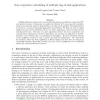Free Online Productivity Tools
i2Speak
i2Symbol
i2OCR
iTex2Img
iWeb2Print
iWeb2Shot
i2Type
iPdf2Split
iPdf2Merge
i2Bopomofo
i2Arabic
i2Style
i2Image
i2PDF
iLatex2Rtf
Sci2ools
111
click to vote
INFOCOM
2007
IEEE
2007
IEEE
Non-Cooperative Scheduling of Multiple Bag-of-Task Applications
Multiple applications that execute concurrently on heterogeneous platforms compete for CPU and network resources. In this paper we analyze the behavior of K non-cooperative schedulers using the strategy that would be optimal if they were alone on the platform. Meanwhile fairness is ensured at a system level ignoring applications characteristics. We limit our study to simple single-level master-worker platforms and the case where applications consist of a large number of independent tasks. The tasks of a given application all have the same computation and communication requirements, but these requirements can vary from one application to another. Therefore, each scheduler aims at maximizing its throughput. We give closed-form formula of the equilibrium reached by such a system and study its performances. We characterize the situations where this Nash equilibrium is Pareto-optimal and show that even though no catastrophic situation (Braess-like paradox) can occur, such an equilibrium ca...
Communications | Heterogeneous Platforms | INFOCOM 2007 | Level Ignoring Applications | Single-level Master-worker Platforms |
| Added | 03 Jun 2010 |
| Updated | 03 Jun 2010 |
| Type | Conference |
| Year | 2007 |
| Where | INFOCOM |
| Authors | Arnaud Legrand, Corinne Touati |
Comments (0)

